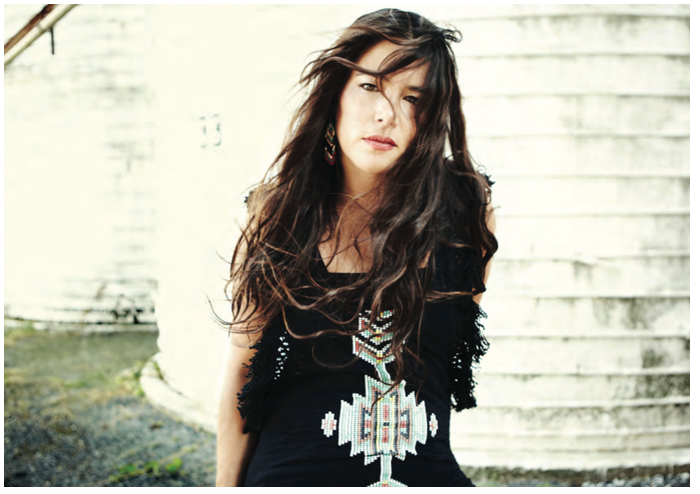The year was 2004 when a 20-something Rachael Yamagata released her first full-length studio album, Happenstance. It proclaimed to the music-listening world that a talented singer-songwriter had arrived, one who could compose and record simmering ballads, as well as slow-burning rockers, with her breathy vocals expressing emotionally truthful lyrics. It led to her songs being featured in films like Hope Springs and Definitely, Maybe and television shows such as Grey’s Anatomy, The O.C. and How I Met Your Mother. Her tunes also caught the attention of other musicians and would result in collaborations with the likes of Jason Mraz, Conor Oberst and Rhett Miller.
To celebrate the 10-year anniversary of her debut album, Yamagata performed Happenstance in its entirety on select stops on her recently completed fall tour. “It’s crazy. It’s almost like a double tour,” she says, a few hours before hitting the stage of the Bluebird Theater in Denver last October.
“When Happenstance came out, it was very much about the struggles of love and partnership, and being focused on another person,” says Yamagata, explaining the circumstances that fueled her early songs.
But now, a decade of experience behind her, and two more studio albums and four EPs later, her perspective has shifted towards the “internal battles that we are fighting with ourselves and the struggle to find balance and happiness,” she says. Her more recent lyrics – she’s finalizing her as-of-yet untitled album for release in spring 2015 – are “less about a love-centered partnership and more about an internal struggle.”
To get to this point, Yamagata had a relatively late start. At Northwestern University, she was studying acting, but one night she went out and saw a local funk band called Bumpus perform in Chicago, and it changed her life. Yamagata says, “I never went out to see people performing music before, and the whole experience got my attention.”
It went both ways, because Yamagata got the band’s attention, too. She ended up joining Bumpus, singing and helping to write songs. “I have always played piano or made up songs, but I never turned to music as my focus. I didn’t think I’d ever do it as a career,” she says.
She also discovered that songwriting came naturally to her. “It caught me in a way that reading a script or trying to understand acting hadn’t yet,” she says. For the self-described introvert, the process allowed her to express her vulnerability and to work out “a greater understanding of things.” She adds, “It’s easy for me in the music. It almost comes more naturally than daily life. The songs are always personal and intimate.”
So when she left Bumpus to embark on a solo career, she had gained the songwriting skills to cultivate a following. With her frequent and extensive touring across the U.S. and worldwide, her bold onstage persona captivated many a fan. And yet Yamagata believes she is “not a very outgoing person, naturally.” She says, “The performance part is a stretch for me, though I seem to know how to do it. People are surprised when I tell them that, but I’d be just as happy sitting in the woods writing songs.”
And that is literally where she calls home. Yamagata settled into a house she describes as a “cabin in the woods” about a year ago (she claims she’s “very good at yard work”). Located in Woodstock, New York, her mother’s hometown, the home-slash-studio is filled with musical instruments and some rambunctious cats. She divides her time between recording at home, still in various states of “DIY renovation,” she laughs, and a full studio in town. “We recorded some music to see if it could be done in the house,” she says. “There’s a looseness and a comfort about recording at home, and you know your surroundings.”
A younger Yamagata, who had grown up with a twin brother in the suburbs of Maryland, was less inclined to such domesticity. Dreaming of the world beyond, her travels took her across Europe, as well as living solo in the Dominican Republic. Her own family is a veritable United Nations. “My dad is third-generation Japanese. My mother is German-Italian. My stepmother, who’s since passed away, was the southern belle, and my stepfather, who is Jewish, was a music rebel who grew up in the streets of New Jersey,” Yamagata explains. “Growing up, I learned different cultural identities from each of them. The love was unconditional.”
Now, as she matures as a musician and songwriter – she says her aesthetic is “grittier, a bit darker, but still with romantic elements” – Yamagata’s also dealing with a quickly changing music business, working as an artist self-managing her career and running her own independent label. “I wouldn’t recommend it for everybody,” she says. “You really do have seven jobs. It’s time consuming and difficult on many levels.
“But for me, it works really well right now,” she continues. “I spent a number of years on major labels, and the record industry itself is so unpredictable. And it was taking four years between every record, which is crazy. To have to wait four years every time you want to put something new out is incredibly frustrating.”
Though she does miss having a team behind her (“When it works, it can be great”), “at the end of the day,” she says, “you’re going to care more than anyone else about your own art or your own career.”
These days, going independent necessitates getting creative to further musical goals. Yamagata is currently running a Pledge Music campaign, a crowd-funding program that will allow her to produce her next album as well as record a new acoustic version of Happenstance. “Pledge is a fan-based, connected platform to help artists show the behind-the-scenes process of making a record or going on tour, and the fans preorder the new album that they are helping to fund,” she explains. “You can offer different incentives and make it really cool with items that fans would enjoy but normally have no other way of getting. We’ve been running that simultaneously with the tour, and then, when I get back from tour, I’ll finish making the new record. So it’s a very busy time, that’s for sure.”
From major label complete with a “team” to independent running your own crowd-funding campaign, Yamagata’s definitely spent some time in the musical trenches. And yet her advice to up-and-coming musicians today is something she’s always done. “Play live, as much as possible,” she says. “Put yourself out there doing music, and build your fan base. Pay attention to your fans. The other stuff is unpredictable, but you can do great music that you love and other people will start loving it, too. It all starts with people who love your music.”
Story by SUSAN SOON HE STANTON
Photo by LAURA CROSTA
This story was originally published in our Winter 2014-15 issue. Get your copy here.
[wp_ad_camp_2]








